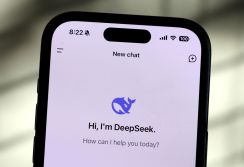Senate bill targets DeepSeek ban from government devices

A bipartisan trio of senators introduced a bill this week to ban the Chinese artificial intelligence platform DeepSeek from all federal government devices and networks.
The bill from Sens. Jacky Rosen, D-Nev., Jon Husted, R-Ohio, and Pete Ricketts, R-Neb., followed the introduction earlier this month of the No DeepSeek on Government Devices Act from a bipartisan group of two dozen House lawmakers.
“As the artificial intelligence landscape continues to rapidly expand, the U.S. must take steps to ensure Americans’ data and government systems remain protected against platforms — like DeepSeek — that are linked to our adversaries,” Rosen said in a statement. “This bipartisan legislation takes proactive steps to ban DeepSeek on all U.S. government devices, helping to further safeguard sensitive government data from the Chinese Communist Party.”
The bicameral push to block DeepSeek from government devices comes after a Silicon Valley freakout over the revelation that the Chinese startup’s low-cost, open-source artificial intelligence model was just as good, if not better, than offerings from American AI firms.
Since DeepSeek burst into public consciousness a month ago, it has reported challenges in registering new users due to “large-scale malicious attacks” on its services. Additionally, a security issue at the company has exposed sensitive internal data, researchers at Wiz found.
“DeepSeek is a tool that perpetuates Communist China’s agenda — full stop,” Husted said in a statement. “It exposes Americans’ data to our adversary’s government, lies to its users, and exploits American workers’ AI advances. We can’t afford for U.S. officials to play into Beijing’s hands by hosting this hostile bot on their devices.”
DeepSeek has already been banned on state-owned devices and networks in New York, Virginia and Texas. The platform has also been barred from use on Senate and House devices, according to Axios.






